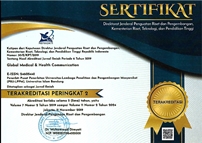The Effectiveness of Lactation Counseling on Knowledge, Self-Confidence, and Successful Breastfeeding for Postpartum Mothers
Abstract
The best primary nutrition for babies is breast milk. Exclusive Breastfeeding is given since the baby is born for six months. Breastfeeding proofed to reduce infant mortality and morbidity. The rate of exclusive breastfeeding in Indonesia is still low at around 37.3%. The cause of the low number of breastfeeding is the lack of information obtained by the mother, affecting the mother's knowledge and belief. Breastfeeding mothers need the correct information. This information can be obtained from lactation counseling provided by health workers. This study aims to analyze the effect of counseling on knowledge, mothers' self-confidence, and breastfeeding ability in postpartum mothers. This research was conducted in July–September 2021 in the working area of the Sukaluyu Public Health Center, Cianjur regency. This research method uses a quasi-experimental design with a post-test only with a control group design—the sample in this study was 60 respondents, primigravida mothers aged 37 weeks to 1 month postpartum. The analysis used is the t-test and the Mann-Whitney test. This study uses three instruments: knowledge, self-confidence in the form of a Breastfeeding Self-Efficacy Scale Form (BSESF) questionnaire, and a breastfeeding ability observation sheet. The study results on mothers' knowledge in the intervention group were higher, namely 26, and there was a significant difference between the knowledge of the two groups (p=0.03). There are differences in the beliefs of breastfeeding mothers after being given counseling (p=0.001). There is no difference in the mothers' ability of the two groups after counseling (p=1.000). In conclusion, lactation counseling using video media increases the knowledge and confidence of breastfeeding mothers compared to those given standard care.
Keywords
Full Text:
PDFReferences
Jerin I, Akter M, Talukder K, Talukder MQEK, Rahman MA. Mobile phone support to sustain exclusive breastfeeding in the community after hospital delivery and counseling: a quasi-experimental study. Int Breastfeed J. 2020;15(1):14.
Pusat Data dan Informasi, Kementerian Kesehatan Republik Indonesia. Mari dukung! Menyusui dan bekerja [Internet]. Jakarta: Pusat Data dan Informasi, Kementerian Kesehatan Republik Indonesia; 2015 [cited 2021 October 30]. Available from: https://pusdatin.kemkes.go.id/resources/download/pusdatin/infodatin/infodatin-asi-2015.pdf.
Westerfield KL, Koenig K, Oh R. Breastfeeding: common questions and answers. Am Fam Physician. 2018;98(6):368–73.
Badan Penelitian dan Pengembangan Kesehatan, Kementerian Kesehatan Republik Indonesia. Hasil utama riskesdas 2018 [Internet]. Jakarta: Kementerian Kesehatan Republik Indonesia; 2019 [cited 2021 November 20]. Available from: https://kesmas.kemkes.go.id/assets/upload/dir_519d41d8cd98f00/files/Hasil-riskesdas-2018_1274.pdf.
Dinas Kesehatan Provinsi Jawa Barat. Profil kesehatan Provinsi Jawa Barat [Internet]. Bandung: Dinas Kesehatan Provinsi Jawa Barat; 2017 [cited 2021 November 25]. Available from: https://diskes.jabarprov.go.id/assets/unduhan/28.%20PROFIL%20KESEHATAN%20JAWA%20BARAT%20TAHUN%20%202017.pdf.
Dinas Kesehatan Kabupaten Cianjur. Profil Kesehatan Kabupaten Cianjur.; 2018.
Suksesty CE, Hernowo BS, Damayanti M, Husin F, Sekarwana N, Sumintardja EN. Peran konseling laktasi dengan penerapan media terhadap keyakinan diri dan keberhasilan menyusui pada ibu post partum. IJEMC. 2016;3(2)48–56.
Nababan S, Yikwa E, Widjanarko B. Health promotion media to behavior change on exclusive breastfeeding mothers. J Promkes. 2019;7(2):233–9.
Radzyminski S, Callister LC. Mother’s beliefs, attitudes, and decision making related to infant feeding choices. J Perinat Educ. 2016;25(1):18–28.
Adam M, Johnston J, Job N, Dronavalli M, Le Roux I, Mbewu N, et al. Evaluation of a community-based mobile video breastfeeding intervention in Khayelitsha, South Africa: the Philani MOVIE cluster-randomized controlled trial. PLoS Med. 2021;18(9):e1003744.
Wu Q, Huang Y, Helena van Velthoven M, Wang W, Chang S, Zhang Y. Feasibility of using WeChat to improve infant and young child feeding in rural areas in China: a mixed quantitative and qualitative study. PLoS One. 2021;16(2):e0246942.
Gallegos D, Russell-Bennett R, Previte J, Parkinson J. Can a text message a week improve breastfeeding? BMC Pregnancy Childbirth. 2014;14:374.
McCarter-Spaulding DE, Dennis CL. Psychometric testing of the Breastfeeding Self-Efficacy Scale-Short Form in a sample of Black women in the United States. Res Nurs Health. 2010;33(2):111–9.
Nursan C, Dilek K, Sevin A. Breastfeeding self-efficacy of mothers and the affecting factors. Aquichan. 2014;14(3):327–35.
Mardiyah S, Anggorowati, Nurrahima A. Effects of peer education on improving self-efficacy of pregnant women in breastfeeding the baby. PJMHS. 2019;13(4):1282–5.
Liliana A, Hapsari ED, Nisman WA. Pengaruh konseling laktasi terhadap pengetahuan kemampuan dan keberhasilan ibu dalam pemberian ASI. J Keperawatan Respati Yogyakarta. 2017;4(2):189–93.
Sutrisminah E, Hudaya I. Pengaruh konseling laktasi intensif terhadap keberhasilan pemberian air susu ibu (ASI) eksklusif sampai 6 bulan di Kelurahan Kudu Kecamatan Genuk Kota Semarang. Involusi. 2015;10(1):12–16.
Vidayanti V, Wahyuningsih M. Efektifitas konseling laktasi terhadap efikasi diri dan kemampuan menyusui ibu pasca bedah sesar. J Keperawatan Respati Yogyakarta. 2017;4(2):154–162.
Armini NW, Marhaeni GA, Suarniti NW, Astiti NKE, Purnamayanti NMD. Meningkatkan self efficacy ibu hamil dalam pemberian air susu ibu (ASI) eksklusif melalui edukasi dengan metode EMO-DEMO di Desa Batubulan Kangin. JPMS. 2020;2(2):113–9.
Ngadiarti I, Soekatri MYE, Srimiati M, Fayasari A, Agestika L. Pengaruh konseling pada pengetahuan dan asupan ibu di wilayah kerja Puskesmas Kebayoran Baru Jakarta. Gizi Indones. 2021;44(1):87–96.
Riyanti E, Nurlaila, Astutiningrum D. Pengaruh edukasi breastfeeding ibu post partum terhadap breastfeeding self efficacy. JIKK. 2018;14(3):96–104.
Kurniawati N, Kurniasari E. Pengaruh konseling cara menyusui terhadap pelaksanaan cara menyusui pada ibu yang mempunyai bayi usia 0–2 minggu di Puskesmas Ngombol. JKK. 2020;11(1):28–38.
Ambarwati R, Muis SF, Susantini P. Pengaruh konseling laktasi intensif terhadap pemberian air susu ibu (ASI) eksklusif sampai 3 bulan. JGI. 2013;2(1):15–23.
Fatmasari BD, Unde AA, Sundari, Utami R, Chiani SH, Mushawwir A. Pengaruh edukasi berbasis buku saku dan lembar balik terhadap keberhasilan inisiasi menyusu dini di Kota Makassar. J Keperawatan Muhammadiyah. 2020;Spec No:107–13.
Aprilina HD, Siswosudarmo R, Setiyarini WI. Pengaruh konseling laktasi pada ibu hamil trimester III terhadap pemberian prelaktal bayi baru lahir. J Kesehat Reproduksi. 2015;2(2):85–92.
Pramanik YR, Sumbara, Sholihatul R. Hubungan self-efficacy ibu menyusui dengan pemberian ASI eksklusif. JIKI. 2020;8(1):39–44.
DOI: https://doi.org/10.29313/gmhc.v10i1.8811
pISSN 2301-9123 | eISSN 2460-5441
Visitor since 19 October 2016:
Global Medical and Health Communication is licensed under a Creative Commons Attribution-NonCommercial-ShareAlike 4.0 International License.






























.png)
_(1).png)
_(1).jpg)
